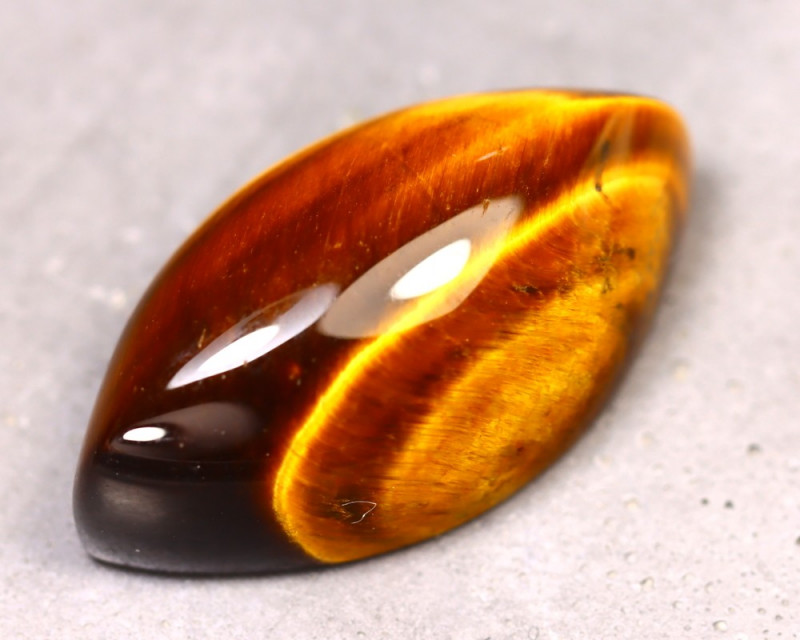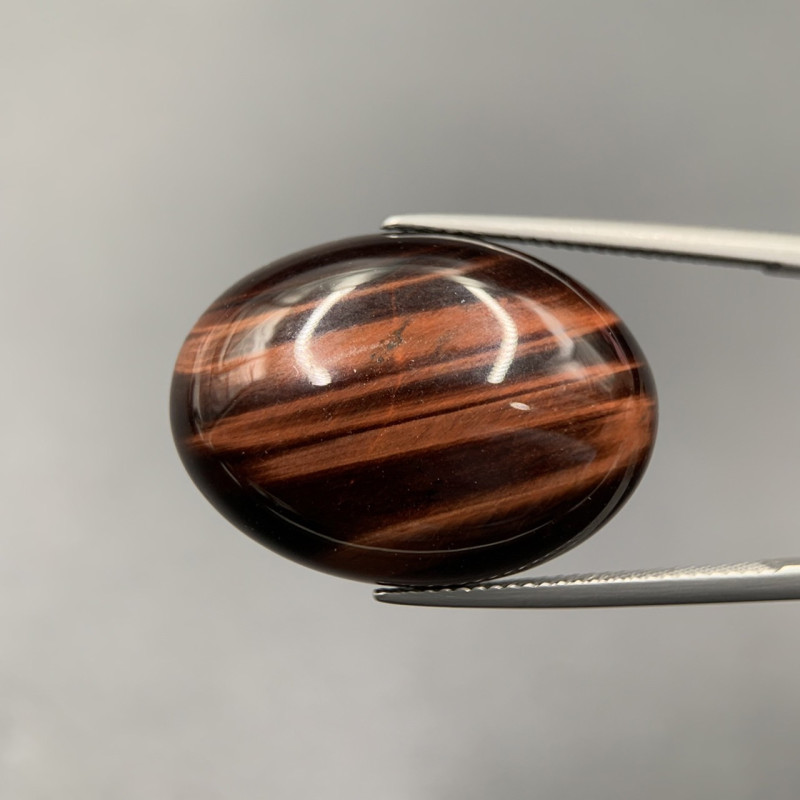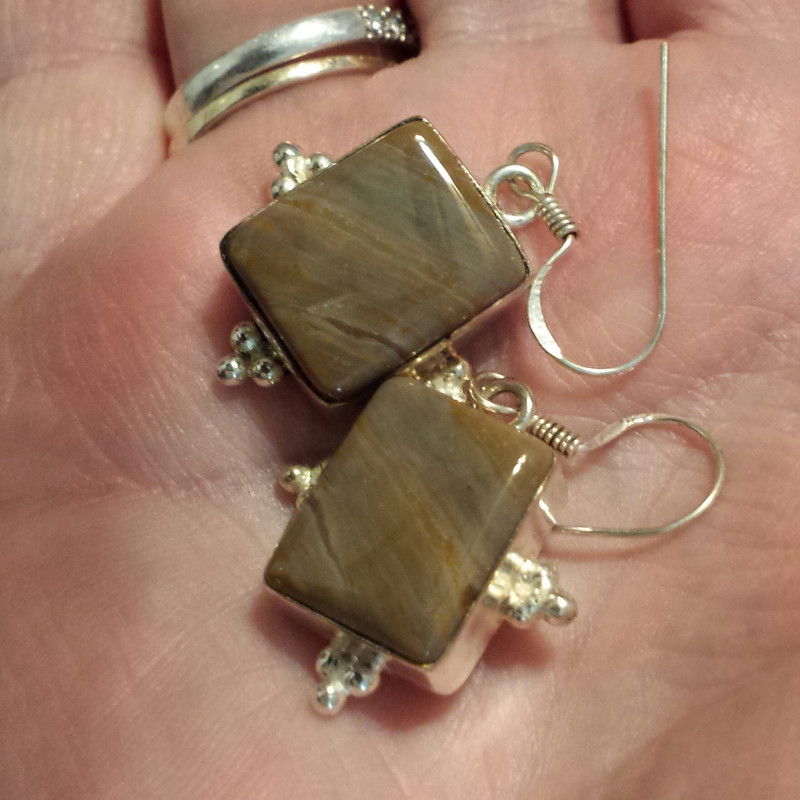
Tiger Iron Gemstone: Properties, Meanings, Value & More
 Tiger iron is an opaque gemstone with layers colored golden-brown, red, and black. Unlike most gemstones, tiger iron is a rock instead of a mineral.
Tiger iron is an opaque gemstone with layers colored golden-brown, red, and black. Unlike most gemstones, tiger iron is a rock instead of a mineral.
If you don’t know, rocks contain multiple minerals (and/or mineraloids), so the exact amount of each mineral varies from one tiger iron rock to the next.
That said, the basic mineral combination inside tiger iron is tiger’s eye, hematite, and jasper. The variation of these minerals among different tiger iron stones creates beautiful, autumnal patterns unique to each specimen.
Want to learn more? Read on as we fill you in on tiger iron’s properties, healing benefits, prices, and more!

About Tiger Iron Stone
Tiger iron is a semi-precious gemstone, joining similar semi-precious rocks used as gems like lapis lazuli, zebra rock, and charoite, to name a few.
Astrologically, tiger iron is a zodiac stone for a few different signs. The stone’s earth energies complement earth signs Capricorn, Taurus, and Virgo. It’s also believed to benefit Leo and Scorpio.
In Chinese astrology, tiger iron graces those born in the Year of the Tiger — 2022 is the most recent, but other tiger years include 2010, 1998, 1986, 1974, 1962, and 1950.
Though it’s not a traditional birthstone, tiger iron can be substituted over the traditional, similar-looking jasper as a March birthstone.
Some nicknames for tiger iron are:
Tiger’s eye matrix
Tiger eye matrix
Iron tiger eye
So is tiger iron the same as tiger’s eye? No, but they’re easily mixed up.
 Pictured above: Tiger's Eye
Pictured above: Tiger's Eye
Tiger Iron vs. Tiger’s Eye
Tiger’s eye is a golden- to reddish-brown rock (usually metamorphic) named for the way its colors seem to glint and shift as you turn the stone, similar to… well, a tiger’s eye.
There are many similarities between tiger iron and tiger’s eye. They’re both opaque rocks with a high polish and similar golden-brown striped coloring.
But the coloring slightly differs between the two. While each stone varies from one specimen to the next, tiger’s eye generally has more gold. Tiger iron has more predominant black and red bands.
The reason for the color differences lies in their composition.
Tiger’s eye contains chalcedony (microcrystalline quartz) and crocidolite, an amphibole mineral that creates the gem’s signature chatoyancy (the “cat’s eye” effect). But tiger iron contains tiger’s eye and other minerals.
On that note, what is tiger iron made out of?
Tiger Iron Specifications & Characteristics
Tiger iron is sometimes considered a variety of ironstone with the general formula SiO2 and Fe2O3.
Because tiger iron is a rock, its chemical composition varies more than individual minerals that each have a set chemical composition. Therefore, we’ll go over each mineral in tiger iron.
The primary minerals in tiger iron are tiger’s eye, hematite, and jasper. You know about tiger’s eye already, so let’s move onto hematite and jasper.
Hematite, or haematite, is a dark iron oxide mineral known for its trademark red to red-brown streak and a metallic sheen. This mineral creates tiger iron’s black or gray metallic stripes.
Jasper is a broad category that describes opaque, color-banded chalcedony stones. Some popular sub-types are bumblebee jasper, mookaite jasper, and kambaba jasper. The jasper you’ll see in tiger iron is usually red jasper, which gets its color from iron impurities.
The multiple minerals at play also mean tiger iron’s hardness is broader than most stones, ranging from 5 to 7 on the Mohs mineral hardness scale.
Below are all of tiger iron’s properties:
Mohs hardness: 5-7
Color: Multi-colored banding in golden-brown, red, and black or gray
Crystal structure: None (rock)
Luster: Vitreous (glassy), silky, or metallic
Transparency: Opaque
Refractive index: 1.544-3.220
Density: 2.64-2.71
Cleavage: None
Fracture: Fibrous or splintery
Streak: Yellowish-brown or red
Luminescence: None
Pleochroism: None
Is there more than one type of tiger iron? You bet!
 Pictured above: Marra mamba carving
Pictured above: Marra mamba carving
Types of Tiger Iron
Tiger iron has a couple varieties you may see around. One is also used as a nickname for tiger iron: mugglestone.
Mugglestone is a type of tiger iron with less contrasted color bands. This variety has less red jasper and more hematite. Despite the name, it’s sadly not associated with Harry Potter. Rather, it likely derives from “mucklestone,” a village in England near a neolithic stone monument locally dubbed “devil’s ring and finger.”
The second variety is marra mamba.
Marra mamba may or may not be a tiger iron variety, as some call it a tiger’s eye variety. Regardless, marra mamba gems are stones with color-banding usually in red, brown, and green. Rarer specimens have gold, red, brown, green, yellow, and blue bands. Marra mamba stones only come from the Hamersley Ranges of Western Australia.
With all the properties and varieties covered, let’s shift gears a bit to go over tiger iron’s spiritual meaning.

Tiger Iron Meaning & History
Tiger iron symbolizes strength, protection, and courage. The stone is particularly prevalent in Feng Shui, the ancient Chinese practice of balancing certain energies by arranging items accordingly in a space.
Feng shui is all about balance, which can be achieved with combinations of different elemental colors. Tiger iron combines the earth color brown with the fire color red and the water color black — a balanced trio!
Additionally, the tiger is significant in Chinese mythology. This animal is one of the four celestial animals (a.k.a. four guardians or four auspicious beasts). In lore, the tiger symbolizes strength, foresight, and wisdom.
History
The name “tiger iron” likely derives from its association with tiger’s eye and addition of iron-heavy minerals in the stone.
The first discovery of tiger iron is unclear, as the stone isn’t in official mineralogical literature. However, its resemblance to tiger’s eye means some of that stone’s history may carry over.
In ancient times, tiger’s eye stones were used for protection and good luck by Sri Lankans and Egyptians.
The first official discovery of tiger’s eye occurred in 1803, when German naturalist Martin Heinrich Lichtenstein found the first type specimens along the Orange River in Southern Africa. German chemist Martin Heinrich Klaproth made the first official analysis of the specimens in 1811.
As a possible ironstone variety, tiger iron’s history also ties to that of ironstone. Though ironstone has been used for centuries, the first recorded discovery occurred in the mid-1800s. Two American miners made the discovery along Lake Michigan, John Vaughan and John Marley. They subsequently established the Eston mines.
Back to the stone at hand, what is tiger iron good for?

Tiger Iron Healing Properties
Tiger iron can be used as a powerful healing stone, each of its colors bringing different energies.
The stone’s red stripes evoke the empowering and energizing properties of red gemstones. Meanwhile, the brown hues offer brown gemstone properties of grounding and balance. Lastly, black gemstone hues bring protection and strength.
Now, what about tiger iron’s physical, emotional, and chakra healing properties?
Physical Healing
Physically, tiger iron is said to treat or help with:
Fatigue
Endurance
Muscle strength
The stone’s iron content also ties to the importance of iron medications in treating blood issues and keeping your energy up. Crystal healers also recommend keeping malachite and tiger iron beside your computer to protect from electromagnetic radiation.
Emotional Healing
Some of the emotional tiger iron benefits include providing you comfort during times of stress and balancing emotions. It’s also said to help you let go of limiting beliefs and encourage you to ambitiously pursue your goals with confidence.
Chakra Healing
Chakra healing is an ancient art of balancing your chakras (energy centers along your body) to promote your wellbeing. What chakra is tiger iron used for? Usually, tiger iron is used as a root chakra stone.
The root (or base) chakra is the first energy center, governing fundamental needs like stability and safety. When tiger iron opens the chakra, it helps create a steady foundation for your personal growth.

Tiger Iron Gemstone Properties
Though tiger iron is a gemstone, it’s not usually graded like most gemstones. Still, we’ll touch on some of the standard value factors like color, cut, luster, and carat weight.
Color: Most tiger iron stones have brick red, dark gray to black, and golden-brown coloring. The rarest and most valuable specimens add other colors into the mix like green or blue. Distinct color banding is also more valuable.
Cut: Tiger iron is typically cut as cabochons or beads. It may be carved into shapes like figurines, pendulums, and spheres, to name a few. Some may choose to decorate with rough, uncut pieces or sliced slabs of rough. You may even see tiger iron in knife hilts or other weaponry accessories.
Luster: The stone will take a high polish, so a shinier luster is more valuable.
Before it gets fashioned to become tiger iron jewelry or decor, how does tiger iron form?
Tiger Iron Formation & Sources
Tiger iron’s exact formation process is somewhat uncertain, but there are prominent theories. Overall, most scientists agree that tiger iron is sedimentary in some form.
One theory is that tiger iron rocks are stromatolites, layered sedimentary deposits containing fossilized algae and ancient microorganisms.
Another theory states that tiger iron is banded iron formation, a type of finely layered sedimentary rock containing alternating layers or low-iron chert (a type of chalcedony) and iron oxide minerals.
In either case, the layers create tiger iron’s signature color-banded (striped) appearance.
Now, where is tiger iron found?
Mining Locations
The top sources for tiger iron are Western Australia and South Africa. However, other notable deposits are in:
Brazil
England
Mexico
USA (Lake Superior area)
Zambia
Next, we’ll discuss what to expect to pay for tiger iron gemstones.

Tiger Iron Price & Value
Luckily, tiger iron is a fairly abundant, affordable gemstone, making it a budget-friendly jewelry option or lapidary practice stone.
At wholesale sites like Gem Rock Auctions, you can expect tiger iron cabochons to go for around $10 to $80 each. The cabochons are almost always under $1 per carat.
Small tiger iron carvings typically go for around $20 each. Larger carvings like desk spheres can be up to $130.
Most tiger iron jewelry fetches around $20 to $50 unless additional gemstones or pricier metal settings are incorporated.
Before we wrap up, we’ll discuss proper gemstone care for tiger iron stones.
Tiger Iron Care and Maintenance
Tiger iron is relatively durable, but its layered internal structure brings downsides in terms of strength. You may want protective settings for your jewelry, especially for more vulnerable items like a tiger iron ring.
To prevent the stone from getting damaged, don’t clean tiger iron with mechanical systems like ultrasonic or steam cleaners.
Can tiger iron go in water? Yep, tiger iron is safe in water. You can safely clean tiger iron stones with a soft toothbrush, warm water, and mild soap. Rinse away any soap residue after, then dry it with a soft, microfiber or cotton cloth.

Flaunt Your Ferocity in Tiger Iron!
A tiger may not change its stripes, but that’s not so for tiger iron stones. These gems each have unique stripes and color banding, so you’re sure to have a stone unlike any other. With confidence-boosting properties and fiery colors, tiger iron is sure to bring out your inner tiger!
Search the Gemstone Encyclopedia
Related Auctions
Related Articles
Originally the Birthstones or gemstones were associated with a zodiac sign or the month of a individuals birth. Find out what your stone is and view the stones we have for sale
8th Feb 2021
There are dozens of quartz and chalcedony gems with various colors and patterns. Learn all about quartz properties and every type of quartz, from amethyst and agate to plasma and phantom quartz!
15th Oct 2020
Hackmanite is a pink to violet sodalite gem known for its unique color-change and luminescence. Learn why hackmanite is special, from its rare qualities to the types of hackmanite jewelry available.
28th Mar 2018
Latest Articles
Simpsonite is a lesser-known mineral known on the gem market for its durability, yellow-orange color, and rarity. Discover all the properties, uses, prices, and history of simpsonite.
3rd Mar 2025
Kurnakovite is a colorless crystal related to inderite and rarely faceted but known among collectors. Explore the mineral traits, history, prices, and more in this kurnakovite guide.
17th Feb 2025
Prosopite is an uncommon gemstone known for its rare robin’s egg blue form used for cabochons. Discover the history, benefits, prices, and powers of prosopite gemstones!
3rd Feb 2025
Article Categories
How To's is where you will find helpful articles from gem Rock Auctions on how to cut gemstones, select gemstones and buy gemstones.
9 Articles




